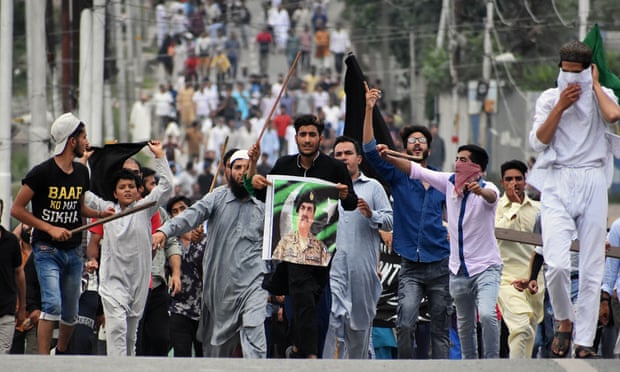by PRETI TANEJA

Seventy years after partition, the annexation of Kashmir by India is the endgame of Devraj, the Hindu nationalist businessman protagonist of my 2017 novelWe That Are Young. His tactic is settler-colonialism: he is opening a seven-star hotel in Srinagar. But according to Article 370 of the Indian constitution, which among other protections prohibited non-Kashmiris from owning property there, he should never have been allowed to build it.
In real life, Article 370 was last week unilaterally abolished by the Indian government. The Kashmiri population were placed under lockdown; there was a shortage of medicines and baby food, people were not able to speak to family members outside the state. Reports emerged that police used tear gas and pellet guns to break up peaceful protest.
The international community was caught off guard. But Kashmir has long been known as the most militarised region in the world. Trapped between India and Pakistan, the people have suffered decades of human rights abuses and state-sanctioned violence. The mass of papers in the UN archives since 1947 reveal much international diplomacy, but a lack of political will to intervene.
Curfewed Night is the Kashmiri writer Basharat Peer’s moving memoir. He was just 13 years old in 1989, when the separatist movement turned violent. He writes of the desire for self-determination, the brutal Indian response. Of the friends who left their villages to train as fighters in Pakistan; of those who “disappeared”, possibly to Indian torture centres run off?grid; and the “half widows” left behind.
In Do You Remember Kunan Poshpora? five Kashmiri women piece together the evidence of a mass rape perpetrated by Indian security forces in 1991, and its cover-up. Though the authors were barely born then, they have lived with that violence for decades. This is an extraordinary book about their determination to uncover the truth.
Freny Manecksha’s Behold, I Shine, also pays tribute to the resilience of Kashmiri women, and includes her interview with Parveena Ahangar, founder of the Association of Parents of Disappeared Persons (ADPD). In the 1990s National Security Guard forces picked up her son; she has not seen him since. She heard he was “stripped […] he desperately wanted a glass of water”; she is now one of Kashmir’s leading activists for justice.
In his novel The Collaborator, Mirza Waheed gives us a boy whose friends vanish. He then gets a job counting corpses for the Indian army and is terrified he will discover his own missing friends. The prose is visceral, the tone dark and absurd. Malik Sajad captures the same desperation in his striking graphic novel, Munnu, about a boy from Kashmir and the shame and compromises Kashmiri artists must make to survive in war. His book damns a world that cares little for people whose land is so strategically placed between India, Pakistan and China, while Feroz Rather’s fierce and lyrical new book of linked stories The Night of Broken Glass, with its evocation of Kristallnacht, tells of those everyday lives, forgotten by the west.
Even as these writers document pain, they also reclaim Kashmiri spiritual traditions fractured by different rulers over centuries. As in poet Agha Shahid Ali’s blazing collection The Country without a Post Office, their work is woven with the words of the 14th-century female mystic Lal Ded and the 16th-century Muslim poet-queen Habba Kahtoun. The poets also haunt Salman Rushdie’s Kashmir novel,Shalimar the Clown, and appear in Kashmir: The Case for Freedom, by writers including Arundhati Roy. Her essential novel The Ministry of Utmost Happiness tracks the rise of Hindu nationalism over decades and brings us almost up to date in Kashmir.
As for Indian culpability, two novels stand out. The Far Field by Madhuri Vijay and Jaspreet Singh’s elegiac Chef bear witness to decades of denial and silencing. With the 72nd anniversary of partition falling this week, these works entreat us to hear what the people of Kashmir have to say.
The Guardian for more